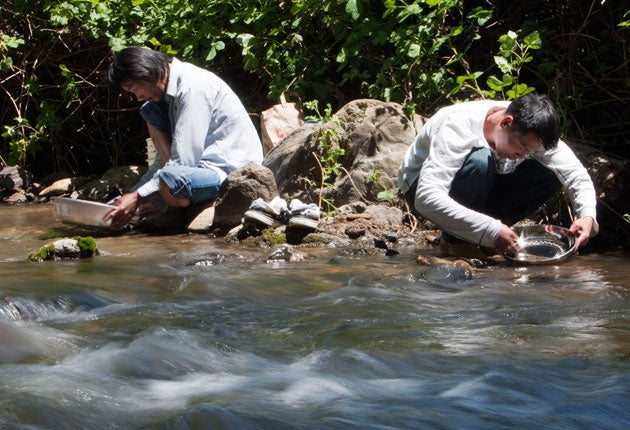Your support helps us to tell the story
From reproductive rights to climate change to Big Tech, The Independent is on the ground when the story is developing. Whether it's investigating the financials of Elon Musk's pro-Trump PAC or producing our latest documentary, 'The A Word', which shines a light on the American women fighting for reproductive rights, we know how important it is to parse out the facts from the messaging.
At such a critical moment in US history, we need reporters on the ground. Your donation allows us to keep sending journalists to speak to both sides of the story.
The Independent is trusted by Americans across the entire political spectrum. And unlike many other quality news outlets, we choose not to lock Americans out of our reporting and analysis with paywalls. We believe quality journalism should be available to everyone, paid for by those who can afford it.
Your support makes all the difference.There's gold in them thar hills. It built the city of San Francisco, and inspired generations of Americans to call California the "Golden State". But if local lawmakers get their way, making a living from the stuff is about to become nigh-on impossible.
Just 162 years after history's greatest gold rush, the state's last remaining prospectors are about to have their way of life declared illegal, amid a long-running battle with salmon-loving environmentalists.
At issue is the practice of suction-dredging, a modern, mechanised version of the gold-panning carried out by the fabled '49ers, who once headed west to seek their fortunes in the rivers and streams of the eastern Sierra Nevada.
Between 3,000 and 4,000 enthusiasts today use the technique to extract gold in California. It involves using motorised rigs which act like giant vacuum cleaners, sucking up gravel and mud from the bottom of a watercourse and then using gravity to sort tiny quantities of gold from the rocks and dirt.
Environmentalists have long harboured concerns about dredging, saying that it disturbs riverbeds in which species such as pacific salmon, which have suffered steep declines in California, lay their eggs. They also say it can release poisonous mercury into the water. In 2009, they succeeded in persuading Governor Arnold Schwarzenegger to agree to a two-year moratorium on the practice while scientists carried out an environmental impact report.
That report is now written, at a cost of $1.5m (£900,000). It runs to 800 pages, and recommends that California relegalises dredging, under a strict set of conditions dictating the size of machines and the seasons they can operate in. Some ecologically important rivers and streams will be declared completely off-limits.
The report's findings are due to come into force in six months. But a few weeks ago, opponents of dredging quietly succeeded in amending California's proposed budget in a way that will extend the moratorium for at least the next five years – and perhaps for ever.
With the help of a Democratic state assemblyman, Jared Huffman, they had a paragraph in the document changed to prevent the Department of Fish and Game, which compiled the impact report, from spending any money reissuing dredging licences until 2017. And with no money to spend, there is no way to relegalise the practice.
"It's crazy," says Rachel Dunn, an amateur prospector who runs Gold Pan California, a mining supply shop near Sacramento. "It's a circumvention of due process, in which a cheap political manoeuvre has been used to circumvent science. They should be ashamed. Gold is the industry that built California. What they are doing is just total lunacy."
The ban is a particularly bitter pill to swallow since gold prices are at record highs of more than $1,500 an ounce. Although that's not enough to make any dredger rich, it's a price that can allow enthusiasts to scrape a living from their hobby.
Mr Huffman argues that he introduced the extended ban to save the state from spending $1.8m a year on licensing and enforcement of the new rules. "We've just got a lot more important things to find funding for," he told The Sacramento Bee newspaper.
He is supported by angling organisations and by some Native American tribes, who believe dredging has destroyed fish stocks. This year's salmon run has been so poor that regulators closed the season after just a few days.
But critics say that with California's unemployment rate hovering at around 10 per cent, the state can ill afford to criminalise a potentially lucrative industry. Many communities in remote mining areas rely on income from the prospectors who visit each year.
Bruce Johnson, who owns a campground in Seiad Valley, in the heart of gold country, says his business relies on the dredging trade. "Is the legislature intentionally dysfunctional?" he asks. "We are holding on for dear life out here and the gold miners could immediately help ease the burden."
The mining lobby says that its members contribute $23m annually to state coffers, through taxes, accommodation, and other expenditure. "But more than that, we are the epitome of the American Dream," adds Mike Dunn. "Suction gold dredging is one of the purest tests of the human spirit, and it kills me to see this happening to it."

Join our commenting forum
Join thought-provoking conversations, follow other Independent readers and see their replies
Comments